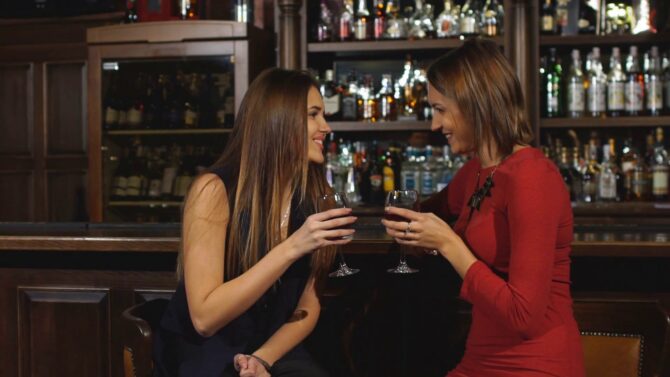
付加疑問文 Tag Questions + Dialogue
Listen for the tag questions.
Mari:
You know what’s the worst?
Alison:
What?
Mari:
When you have to go to the bathroom so badly, and you just cannot find a public restroom.
Alison:
It’s so true, and there aren’t very many alternatives.
Mari:
No. And I feel like we’re so lucky in the US because we have a lot of public restrooms. If you’ve traveled extensively, you don’t always get to places that have them.
Alison:
Exactly.
Mari:
And then you realize… Pretty lucky. Now, the flip side of that is that they are not always the cleanest places, are they?
Alison:
I know! I always worry about my hygiene when I go in. I was in a public restroom the other day, and there were no soap dispensers and no paper towels.
Mari:
I understand. And sometimes, there’s a lack of privacy, like there’s not really doors, and the door doesn’t lock. But you know, when it’s an emergency, they’re your best resource.
Alison:
I am glad we have options.
Discussion
Mari and Jessica agree that public bathrooms have advantages and disadvantages. They are not usually clean places, and Jessica worries about her hygiene whenever she uses a public restroom. Also, because they are public, these bathrooms are often missing necessary supplies, like soap and paper towels. And they don’t always give people enough privacy.
However, Mari and Jessica also think that, in an emergency situation, a public bathroom is a wonderful resource. Not every country has restrooms for people to use when they are traveling around town. Marni thinks people in the US should feel lucky because they have the option to use public restrooms, and Jessica agrees with her.
Do you have many public bathrooms in your country? Are these bathrooms clean or dirty?
Grammar Point
Tag Questions 付加疑問文
Marni and Alison are talking about public bathrooms. Mari says, “Now, the flipside of that is that they are not always the cleanest places, are they?” She uses a tag question.
Tag questions are two word tags added to the end of a statement to make a question. Tag questions give the other person a chance to reply to something that has been said. Although we can use different words to make tag questions, they all mean the same thing: “Do you agree?” or “Am I right?”
We can make tag questions with both positive and negative statements. Positive statements will always have negative question tags, and negative statements will always have positive question tags.
To make a tag for a positive statement, use the negative form of the first auxiliary verb + subject (or its pronoun), as in, “Jane has already seen the movie, hasn’t she?” or, “You are studying tonight, aren’t you?”
To make a tag for a negative statement, use the positive form of the auxiliary verb + subject (or pronoun), as in, “We didn’t eat very much, did we?” Mari uses this type of tag question when she asks, “They are not always the cleanest places, are they?”
For sentences that do not have auxiliary verbs, use do, does, or did. Like other tag questions, make a negative tag for a positive sentence and make a positive tag for a negative sentence. For example, “They don’t have a car, do they?” or, “I forgot my lunch again, didn’t I?”
Tag questions can be used in past, present, or future tense, so it’s important to match the tense of the tag question to the tense of the original statement. For example, “We didn’t get very far, did we?” or, “They will be there, won’t they?”
Which is correct, “They are very dirty, are they,” or, “They are very dirty, aren’t they,”?
Quiz – Public Bathrooms
1. Which sentence is true?
A. There are always paper towels in public restrooms.
B. Some public bathrooms are dirty.
C. There are no public restrooms in the US.
D. All public bathrooms are clean.
2. Which of these things does not belong in a bathroom?
A. Soap.
B. Towels.
C. Toilets.
D. Refrigerators.
3. Hygiene includes ___________.
A. being healthy and clean
B. dirt, mold, and grime
C. being young or old
D. talking to new people
4. Which tag question is not correct?
A. Mom forgot to lock the door again, didn’t she?
B. You’re going to the show, aren’t you?
C. You own a dog, do you?
D. Matt has already left, hasn’t he?
